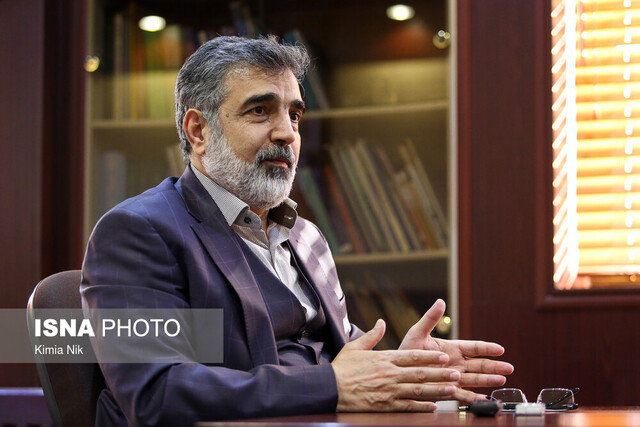Tehran says its new measures are within JCPOA framework

TEHRAN – Iran’s Atomic Energy Organization spokesman has said the country has started a new level of activities under the Joint Comprehensive Plan of Action (JCPOA) as a countermeasure to the United States’ withdrawal from the deal and reimposition of sanctions.
“The country has decided that part of the deal has not been implemented… and I do not believe that the Europeans or the Americans themselves, or any other country for that matter, would deny the fact that the other party has failed to uphold its commitments,” Behrooz Kamalvandi told Alalam in an interview aired on Monday.
He noted that after one year of patience since the U.S. quit the deal, Iran has started to take actions explained in the JCPOA, therefore it is not practically violating the deal.
“This means to use the capacities of the JCPOA. In articles 26 and 36 this right has been given that if it is decided that some of the sanctions are reimposed, the Islamic Republic can stop fulfilling some or all of its obligations,” the official stated.
He underlined that Iran still has given the other party - Europeans in particular - two months’ time to save the international agreement.
“In fact, we are creating some balance between our rights and our commitments. There should be less commitments as there are less rights,” Kamalvandi said.
On May 8, exactly one year after Washington’s withdrawal from the JCPOA, President Hassan Rouhani announced that as a retaliation against the U.S. pullout from the 2015 deal and reimposition of sanctions, coupled with a failure by the European Union to offset sanctions, Iran stops selling stockpiles of enriched uranium and heavy water for 60 days.
According to the announcement, Iran would no longer observe limits for its stockpile of low enriched uranium, currently capped at 300kg under the JCPOA, and heavy water reserve capped at 130 tons.
Iran was exchanging heavy water for importation of yellow cake from Russia.
“This announcement is for 60 days. We have announced to the other side, the five countries [Germany, France, UK, Russia and China], that if they come to the negotiating table in 60 days and we reach a conclusion and safeguard our main interests which are oil [sale] and banking relations, we will return to the previous situation of May 7, 2019,” Rouhani told a cabinet meeting.
However, he warned, if a conclusion is not reached, Iran will resume enriching uranium and will not follow obligations under the JCPOA according to which its uranium enrichment should not exceed the purity level of 3.67 percent.
Pointing to a letter he sent to the leaders of the remaining parties to the JCPOA, Rouhani said he has mentioned in the letter that Iran will give a firm response if the remaining parties refer the issue to the UN Security Council.
The remaining signatories to the JCPOA are Germany, Britain, France, Russia and China.
Rouhani noted that Iran has not quit the JCPOA and its action is within the framework of the articles 26 and 36 of the deal.
“No word reduced or added. The JCPOA is the same JCPOA and will not change. However, we are ready to sit at the negotiating table to better implement it and make your implementation of the commitments better,” Rouhani explained.
Under the JCPOA, endorsed by the UN Security Council Resolution 2231, Iran was tasked to put limits on its nuclear activities in exchange for termination of economic and financial sanctions. However, since Trump pulled the U.S. out of the JCPOA, the European countries cut banking ties with Iran, stopped purchasing Iranian oil, annulled agreements, and their companies left Iran one after another.
Even when the oil sanctions were first introduced against Iran in November 2018, which exempted certain countries, including Greece and Italy, these two EU members refused to buy oil from Iran in limited volumes.
Trump’s exit from the JCPOA and Europeans’ refusal to respect their obligations happened despite the fact that International Atomic Energy Agency (IAEA) has issued 14 reports each time confirming that Iran has been fully abiding by the terms of the agreement.
The Europeans have just expressed political support for the JCPOA without taking a concrete step. Iran has said words will not save the JCPOA.
Russia continues nuclear co-op with Iran despite U.S. forbiddance
In another part of his interview, Kamalvandi answered questions regarding the continuation of cooperation between Iran and Russian on building nuclear power plants in Bushehr.
“[The development of] power plants 2 and 3 (of Bushehr) is about 3 to 4 months ahead of schedule,” he explained.
“America did a stupid thing saying the new Bushehr power plants are under sancionts…. Russia has said it does not consider the sanctions… so America’s statement is only words and will pose no problem,” Kamalvandi explained.
“The same story was true about Power Plant 1, where Russia did its job despite all the technical hardships and political pressure. They have now announced that the sanctions will by no means affect the Iran-Russia nuclear cooperation especially regarding the Bushehr power plants.”
SP/PA
